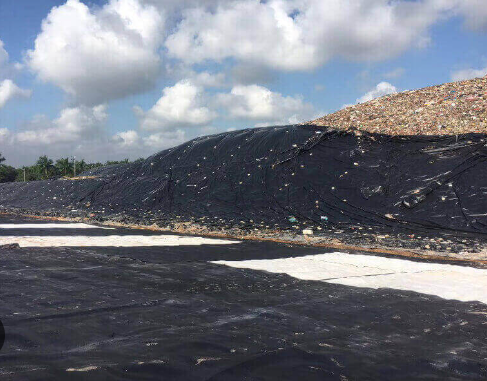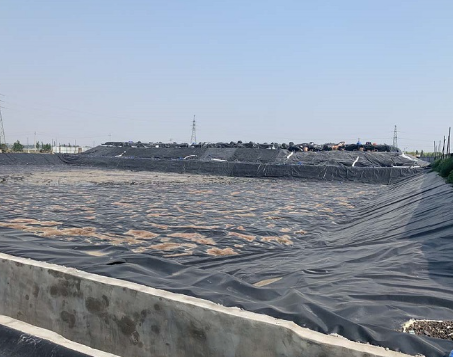- Understanding the Role of Geomembrane Liners in Waste Management
- Innovations in Geomembrane Liners for Water Management
- Geomembrane Liners: A Comprehensive Guide
- The Future of Geomembrane Liners in Civil Engineering
- Geomembrane Liners: Enhancing Landfill Stability
Manager:
WhatsApp:+86 177 0135 2670
Tel:+86 177 0135 2670
Email:marketing@okorder.com
Address:3rd Floor, No.2 Building, No.1 Sanlihe Road
What is the use of geomembrane in landfill engineering?
In waste management, landfills are crucial, providing containers for several types of waste. Nonetheless, to ensure environmental safety and protect surrounding soil and water from pollution, current landfill engineering uses advanced materials as well as techniques. Among these is a geomembrane an indispensible component that lines a landfill preventing the escape of hazardous substances to the atmosphere. This article looks at the importance of composite geomembranes and high-density polyethylene (HDPE) geomembranes in landfill engineering.

Understanding Geomembranes
Geomembranes refer to synthetic polymers sheets which are essentially non-perforated. They act as a critical barrier in construction of landfills by preventing migration of liquid or gases emanating from the waste containment area into external environs These membranes can be laid down along the base and sides of landfills thus forming a secure system that collects all waste material.
Composite Geomembrane: An Overview
Composite geomembranes are engineered to outperform traditional geomembranes. These often consist of multiple layers each with its own function including but not limited to, strength, durability and resistance to chemicals that add up to form a strong composite structure.
Advantages of Composite Geomembranes
Composite geomembranes have various strengths over other means used in landfill engineering:
1.Strengthened Stability: The inclusion of dissimilar materials in composite geo membranes helps increase tensile strength and minimize chances of puncture ensuring stability and reliability on long term basis when such structures are applied in landfills.
2.Increased Resistance Capability: Composite geomembranes made from special barriers can shield against most common types chemical attacks that occur within landfills reducing risks associated with leakage or degradation
3.Faster installation time: Unlike traditional types, they can be easily fabricated hence faster installation times during construction resulting into reduced time frames for construction with lowering labor payments thus making it economical for landfill projects.
4.Modified Design: Composite geomembranes can be designed to suit the specific conditions of various sites offering flexibility in construction and design. These account for better performance and compatibility with site conditions.
Applications of High-Density Polyethylene (HDPE) Geomembranes
High-density polyethylene (HDPE) geomembranes are some of the most commonly used types in landfill engineering. hdpe Geomembranes are made from high density polyethylene resin, a material known for its excellent chemical resistance as well as durability and flexibility.
Key Benefits of HDPE Geomembranes
1.Chemical resistance: The unique manufacturing process of HDPE geomembrane makes it highly resistant to chemical related hazards such as acids, bases or hydrocarbons that may come into contact with the liner hence making them ideal for waste containment within landfills.
2.Endurance: High tensile strength combined with puncture resistance ensures that HDPE geo membranes have long-lasting durability and are more reliable in harsh conditions typical of landfills meaning that there is no breakout or passage through when hazardous wastes have been stored.
3.Flexibility: Highly flexible, HDPE geo membranes can easily be laid on uneven ground surface or around complicated shapes within a given landfill area. This therefore ensures proper covering and confinement even in unfriendly landscapes.
4.Environmentally Friendly: Being inert elements, these cannot harm the environment since they are non-toxic. In addition to this, they do not wear down due to exposure to sun rays hence maintaining overall performance standards for years on end.

Conclusion
Landfill engineering is the practice of utilizing geomembranes including composite geomembranes and HDPE (high-density polyethylene) geomembranes, to ensure safe containment and management of waste. They serve as non-permeable barriers that guard against environmental degradation whereby harmful substances end up escaping and finding their way into the soil or water bodies nearby. With increased tensile strength, durability and resistance to chemical reactions, composite geomembranes as well as HDPE geomembranes serve as dependable options for addressing contemporary waste disposal challenges. Geomembranes are a very important part of sustainable waste management practices in landfill engineering as their importance in effective waste containment cannot be overstated."
-
2024-06-13Geomembrane is not plastic cloth






